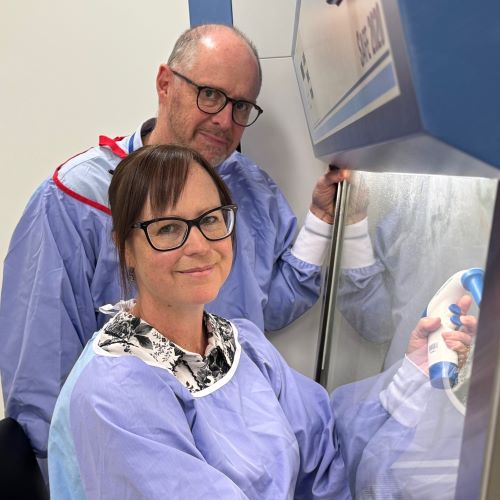
A new tissue culture facility has opened at UniSA today, helping to advance research into two of the most aggressive childhood cancers worldwide - brain tumours and acute myeloid leukemia (AML).
Approximately 120 children and adolescents are diagnosed with brain cancer each year in Australia, making it the second most common cancer in children after leukemia. The prognosis for children under five is brutal, with 45% not surviving their disease.
AML accounts for about 20% of childhood leukemia cases, affecting about 50 new children each year. The survival rate is higher - around 70% - but there is also a high rate of relapse and the existing treatment options leave long lasting effects.
Researchers from the Centre for Cancer Biology (CCB) - an alliance between SA Pathology and the University of South Australia - have welcomed a $36,100 grant from Cops for Kids to help transform an unused space in UniSA's flagship health research precinct into a much-needed tissue culture facility.
CCB Professor of Leukemia Biology Richard D'Andrea says the facility will be an invaluable resource for childhood cancer researchers located in the Bradley Building on North Terrace in the health and biomedical precinct.
"Cellular immunotherapy is an emerging field in childhood cancer treatment and the research to develop and optimise this involves tissue culture to grow and study cells in a specialised laboratory space under sterile conditions," Prof D'Andrea says.
Immunotherapy - using the patient's own immune cells to fight cancer - is now considered the fourth pillar of cancer treatment alongside surgery, radiotherapy and chemotherapy.
Prof D'Andrea says children with AML who are treated with intensive chemotherapy suffer many long-term implications due to the toxic effects of treatment.
"For some, this aggressive treatment does not provide a cure, so better treatments are badly needed to improve outcomes for these children.
"With a cellular immunotherapy approach, immune cells obtained from a patient or from a cord blood source can be engineered or manipulated in the laboratory and used to eradicate the cancer cells, which is less toxic for the patient."
Prof D'Andrea and his CCB team are collaborating with researchers from the University of Queensland to advance the cellular immunotherapy approach to treat childhood AML.
Associate Professor Lisa Ebert, Group Leader of Cancer Immunotherapy Research at CCB, will use the tissue culture lab to further her team's research into paediatric brain cancer, focusing on engineering CAR T-cells, a form of immunotherapy.
"Our main focus is on a type of childhood brain cancer called DMG, or diffuse midline glioma, which is rare, but also uniformly fatal, usually within 12 months of diagnosis because it is inoperable," Assoc Prof Ebert says.
"Chemotherapy doesn't work, and radiotherapy only extends their lifespan by a couple of months, so it's a really horrible disease.
"However, we are currently working with Sydney Children Hospital's network to conduct a clinical trial using CAR T-cells and based on results from the US running similar trials, we are seeing some very exciting results, which could lead to an effective treatment."
The Cops for Kids donation was inspired by a conversation between an Adelaide police officer and Kelly Stevens, founder of the Charlie's Rainbow initiative that funds paediatric AML research at UniSA.
Senior Constable First Class Genevieve Cullinan, a neighbour, friend and client of hairdresser Kelly Stevens, said she was touched by Kelly's courage to establish a charity honouring her son Charlie, who died of AML in 2021 at three years of age.
"Despite Kelly's immense loss and overwhelming sorrow, she has found the strength to create this amazing charity, Charlie's Rainbow, which has raised hundreds of thousands of dollars for AML research in the past four years," Cullinan says.
Cullinan is one of 2000 current and former SAPOL members who contribute a small amount from their fortnightly pay to help improve children's quality of life in South Australia.
The police officer will join the Cops for Kids Board, Kelly Stevens, and CCB researchers in an official launch of the new tissue culture laboratory in UniSA's Bradley Building at 11am today.
Donations to paediatric cancer research at UniSA can be made using the following links:
https://giving.unisa.edu.au/donate-to-charlies-rainbow-aml-research/ (for AML research)
https://giving.unisa.edu.au/donate-to-centre-for-cancer-biology/ (for brain cancer research)
100% of all donations are spent directly on cancer research at UniSA.






